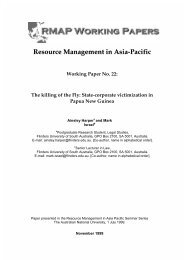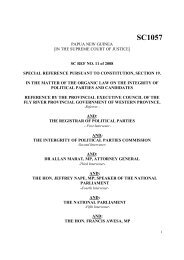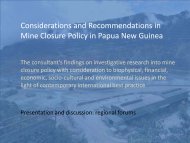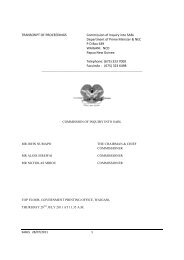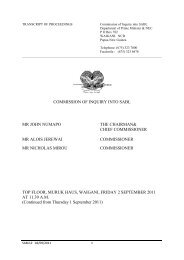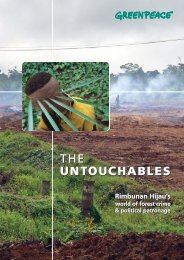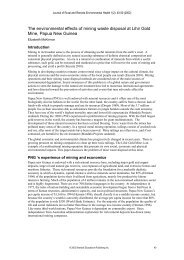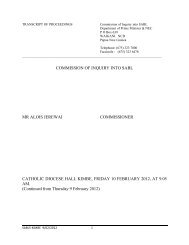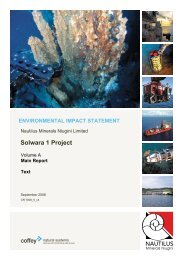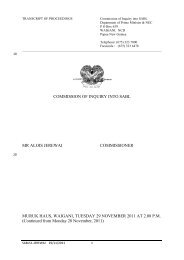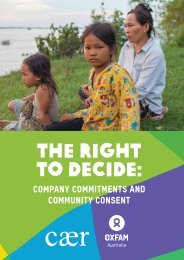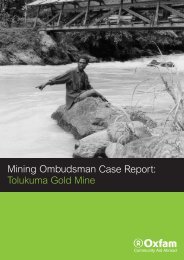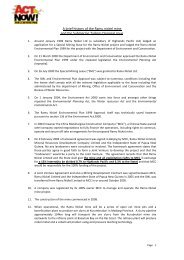Fishy business. The Social Impact of SST.pdf - Act Now!
Fishy business. The Social Impact of SST.pdf - Act Now!
Fishy business. The Social Impact of SST.pdf - Act Now!
Create successful ePaper yourself
Turn your PDF publications into a flip-book with our unique Google optimized e-Paper software.
<strong>SST</strong>C quite rightly claims that RD has nothing to do with them. <strong>The</strong>y will be using the latesttechnology to ensure there are, for example, no detectable odours from the factory. But analysisby the WWF East Sepik <strong>of</strong>fice in Wewak shows that to date <strong>SST</strong>C has not provided the sort <strong>of</strong>environmental effects assessment information normally expected internationally. Thisparticularly applies to social impacts. Given <strong>SST</strong>C makes great play <strong>of</strong> its internationalcorporate partners – and by implication, StarKist’s high environmental standards – this seems amajor omission. <strong>The</strong> company may indeed provide a clean factory with high wages and a goodrelationship with the rest <strong>of</strong> Wewak. <strong>The</strong>re are cases elsewhere where tuna factories do providesome <strong>of</strong> these elements. But experience <strong>of</strong> many communities around the Pacific suggests this isunlikely. For example, the company notes it has to provide low-cost tuna and part <strong>of</strong> the reasonfor coming to PNG is the low wages that can be paid. In addition, the company has told WWFthat negative social impacts are the responsibility <strong>of</strong> the local government. Essentially, it’s yourproblem, not ours.In addition, the NGOs say there is inadequate attention being paid to issues such as thecumulative overfishing <strong>of</strong> tuna in the West Pacific Ocean. While in theory the maximumsustainable yield <strong>of</strong> tuna is only 50-60%, there is no discussion about how affective monitoringwill be when the MSY take reaches 90%. Nor is there any recognition about debate over thewhole concept <strong>of</strong> MSY; the problem <strong>of</strong> by catch and ecological disruption through intensivefishing; the problem <strong>of</strong> local depletion <strong>of</strong> tuna and other fish species to the extent that localfishing declines or disappears; and the whole issue <strong>of</strong> whether it is justifiable to catch deepwater species for canning and/or supply to privileged markets such as Japan.<strong>The</strong> company <strong>of</strong> course claims – again rightly – that they have complied by the laws <strong>of</strong> PNG.<strong>The</strong> question then arises whether these laws, or more particularly the application <strong>of</strong> these laws,is adequate.WWF is providing technical and other support for the NGO group, which is an entirely localinitiative.c. Comments on OEC Submission(WWF) Submission on Environmental Plan Application: South Seas TunaCorporationWewak Tuna Processing Facility February 2001Received: 2 April 2001Tabled 21 March 2001To: Office <strong>of</strong> Environment and ConservationAttention: Luke Tanikrey and Billai LabaThank you for the opportunity to comment on the above.<strong>The</strong> following comments are being made myself on behalf <strong>of</strong> the WWF Sepik Community LandCare Project. However, please note the comments do not necessarily represent the views <strong>of</strong>WWF; they are being made in the context <strong>of</strong> my role as a strategic planner and environmentalconsultant contracted to WWF. In addition, while my work experience includes preparing andauditing environmental effects assessments, the following is an informal review <strong>of</strong> the proposedEnvironmental Plan. I have not had the time nor the resources to undertake a full review.78



